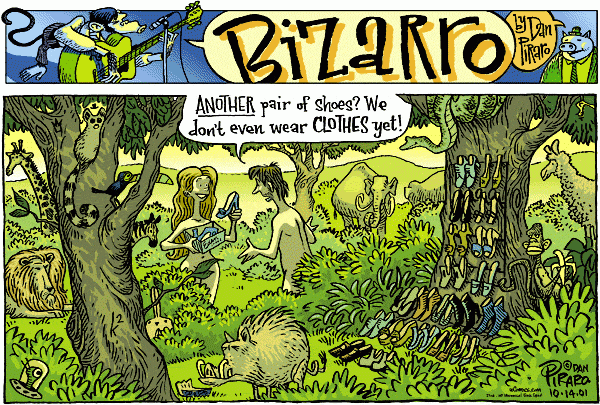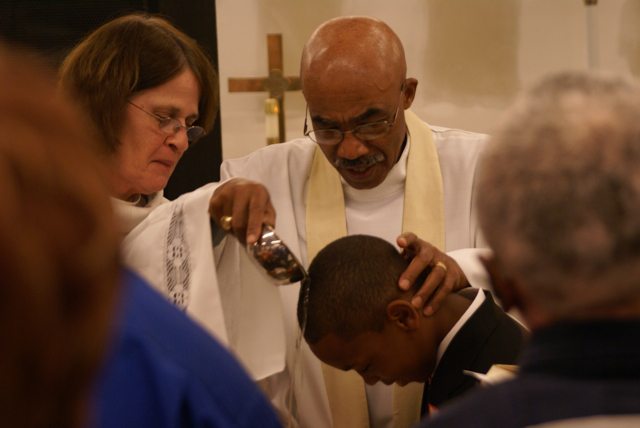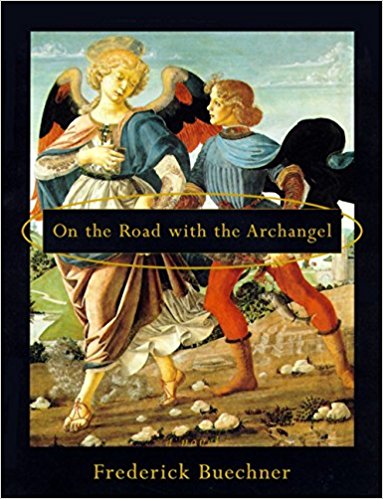 Two-thirds of the way through the semester in my course on Gen. 1-3 and we finally have gotten to that moment when the fruit has been eaten. Yesterday we discussed exactly what happens when Eve and Adam “who was with her” ate of that pesky pear. [mfn]NB: It is simply a “fruit” of the Tree of the Knowledge of Good and Evil, not to be confused with an apple, pear, or pomegranate. I simply liked the alliteration of “pear.” [/mfn] You recall that the serpent told Eve that when she ate of it
Two-thirds of the way through the semester in my course on Gen. 1-3 and we finally have gotten to that moment when the fruit has been eaten. Yesterday we discussed exactly what happens when Eve and Adam “who was with her” ate of that pesky pear. [mfn]NB: It is simply a “fruit” of the Tree of the Knowledge of Good and Evil, not to be confused with an apple, pear, or pomegranate. I simply liked the alliteration of “pear.” [/mfn] You recall that the serpent told Eve that when she ate of it
your eyes will be opened, and you will be like God, knowing good and evil.
So when she and the First Dude did partake, what happened? Sure enough, her eyes were opened and God would later comment to himself (the celestial court/flying spaghetti monster) that “the man has become like one of us, knowing good and evil.” But in that moment in the narrative after they ate we find an echo of the serpent’s words, with a significant difference.
Then the eyes of both were opened, and they knew that they were naked.
My question to the class and to y’all is are we to understand the awareness of nakedness as being the equivalent of knowing good and evil? The structure of the narrative, echoing the serpents words and yet changing them, would seem to imply that. Does that mean being naked is evil?
I know that many scholars suggest that this is a story of sexual awakening (although when I went looking for references I could not find them, any suggestions for readings?), but I have always pushed back against that reading. It has always felt too anachronistic to me, as if an early 20th century psychologist with mommy issues were writing Genesis rather than an ancient Israelite. Now I am not so sure. My students asked a couple of simple questions that have me thinking again.
- How old were Adam and Eve when they were created?
- The answer, as is so often the case in Genesis, is that we do not know. Yet when we consider the next question this becomes more interesting.
- Did they have sex before they ate of the fruit?
- Again, the text is silent but remember that the command to “be fruitful and multiply” is NOT present in Gen. 2 rather it is in Gen. 1. Given that they seemed not simply to be unashamed of their nakedness (Gen. 2:25) but actually unaware that they were naked, it seems unlikely that they would have engaged in coitus.
I still do not think that this is a story about sexual awaking, but I wonder if that metaphor is being used to convey the impact of what happened. It is difficult if not impossible for us (and the author) to imagine what it might mean to suddenly know “good and evil” but we know (and as parents we have seen it happen in our children) the gradual revelation that Jenny is not like John. There is a change from the innocence, a term we often use in this context, of my son and the girl next door running around the yard and playing soccer to the awareness that the one may be attractive to the other. (I don’t think that this is all socially constructed either.)
So while I do not think that Gen. 3 is telling us that nakedness=evil I do think that the awareness of maturity, of Eve and Adam being different, symbolizes their awareness that there is now evil in the world. I suppose that much is obvious and I have taught that for years. But now I think there is much more to the notion that Adam and Eve were in a sexually innocent state before the fruit was et as well.





21 thoughts on ““They saw that they were naked” and sexy?”
@Mishlei_Adam on twitter offers this reference:
see Veenker, Ronald A. “Forbidden Fruit: Ancient Near Eastern Sexual Metaphors.” Hebrew Union College Annual 70-71 (1999): 57-73.
Thanks!
Also, you’ll want to consult James Barr’s The Garden of Eden and the Hope of Immortality, particularly chapter 3. See my summary here: http://kolhaadam.wordpress.com/2009/09/21/review-of-the-garden-of-eden-and-the-hope-of-immortality-part-three/
Just a few thoughts on the subject. I hope they don’t seem disjointed.
When Adam and Eve partook of the fruit, they experienced two kinds of death. We believe that first, their bodies experienced a change that caused them to be mortal, and to have to experience death. Before taking of the fruit, their bodies were immortal. The second death was a “spiritual death” because they were cast out of the garden of Eden and cast out of the presence of God. The atonement of Jesus Christ helps us to overcome both of these types of death. Satan thought that by getting Eve to eat the fruit, that he could frustrate God’s plans. But it was always part of the plan that man be given the freedom to choose, and that if he chose to do what was wrong, Jesus Christ would come to earth to be our Redeemer to help us overcome that spiritual death.
In the Book of Mormon we are taught,
“22 And now, behold, if Adam had not transgressed he would not have fallen, but he would have remained in the garden of Eden. And all things which were created must have remained in the same state in which they were after they were created; and they must have remained forever, and had no end.
23 And they would have had no children; wherefore they would have remained in a state of innocence, having no joy, for they knew no misery; doing no good, for they knew no sin.
24 But behold, all things have been done in the wisdom of him who knoweth all things.
25 Adam fell that men might be; and men are, that they might have joy.
26 And the Messiah cometh in the fulness of time, that he may redeem the children of men from the fall. And because that they are redeemed from the fall they have become free forever, knowing good from evil; to act for themselves and not to be acted upon, save it be by the punishment of the law at the great and last day, according to the commandments which God hath given. 2 Nephi 2:22-26
We also have this further information in the book of Moses:
10 And in that day Adam blessed God and was filled, and began to prophesy concerning all the families of the earth, saying: Blessed be the name of God, for because of my transgression my eyes are opened, and in this life I shall have joy, and again in the flesh I shall see God.
11 And Eve, his wife, heard all these things and was glad, saying: Were it not for our transgression we never should have had seed, and never should have known good and evil, and the joy of our redemption, and the eternal life which God giveth unto all the obedient. Moses 5:10,11
We look at the fall as a blessing because being able to know good from evil is the way that we can learn and progress in this life. So many people try to say that the eating of the fruit was about sexuality, but in our understanding, it was about learning to discern good from evil.
I highly, highly recommend Sib Towner’s article “Interpretations and Reinterpretations of the Fall” in Modern Biblical Scholarship: Its Impact on Theology and Proclamation (preview only at: http://books.google.com/books?id=lL_YAAAAMAAJ)
To know good and evil means to know how to be good and evil; Adam and Eve had not yet disobeyed God, they only knew good, but now they had disobeyed God and so knew good and evil.
Nakedness has a few meanings too: It first means Adam and Eve saw each other lustfully – not as maturity but as loss of purity; it secondly means Adam and Eve were exposed (naked) to judgment – which is why they hid in fear; and it thirdly means Adam and Eve experienced a change in their bodies becoming mortal – they could now suffer the elements and die.
Nick – regarding your first point, I agree. See my post from last Sunday, within that sermon is just this argument: http://targuman.org/blog/2010/10/17/the-origins-of-mercy-gods-justice/
You might also want to check David P. Wright’s “Holiness, Sex, and Death in the Garden of Eden.” Biblica 77/3 (1996) 305-329. Wright argues against the view that their was no sex in the garden pre-fall. Interesting stuff.
BTW when I teach Gen 3, I make point of stressing that the serpent is right: they don’t eat of it and die. Always freaks a few kids out. However, my Muslim students always point out that the Qur’an makes a point of noting that God’s first act of grace wasn’t to just smite the two right then and there.
Remember: it wasn’t the apple on the tree but the pair on the ground 🙂
Jim – Absolutely! Add to that the fact that the serpent is “more cunning than any other wild animal the LORD God had made” and the discussion becomes very frustrating for many. Exactly who/what was the serpent? Just a chatty salamander?
Chris,
I have often mused, even out loud in classes, that we mistakenly stop short when we consider the statement “and they saw they were naked” in isolation. That is, it’s not about the nakedness per se but about what they do next. In that sense, seeing that they were naked is the simplest first act in their new state of acquired “divine” wisdom. Heck — what else would they have seen first? It’s what’s following that is most significant — they discern than nakedness is not good and make clothes for themselves. Thus, they make a judgment (the type of which God had reserved for himself) and they act in precisely the opposite way God did (he left them naked, they now clothe themselves). Both are acts asserting their autonomy from God, which they do by using that level of wisdom God had kept for himself (a similar theme that we see in Job 28).
Excellent point Robert! I do think that their interpreting their nakedness as something to be ashamed about and to be covered is indeed that first indication that the original God-ordained order has been disturbed.
Without getting into all of the particulars, I think a primary function of this story is covenantal theology. Simply put, for much of the ‘theology’ (immediate retribution) in the OT the knowledge of good and evil must exist. It has to go forth from the garden.
In the very next narrative we see this: “If you do well, will you not be accepted? And if you do not do well, sin is lurking at the door; its desire is for you, but you must master it.” Cain doesn’t do so well! I hope I can state without giving examples that this theology can be picked up through Leviticus, Deuteronomy, Ezekiel, and Chronicles as well as other places.
Of course, the broader academic question is whether this story was in response to the Watchers myth and the apocalyptic response to evil.
As for their nakedness, I wonder if Jubilees 3:31 might not offer some context, even though it was written later, but for the same polemical purpose.
Metaphorically speaking, could it be that, in the story, when they “saw that they were naked”…this wasn’t a sexual reference, but a realization of their uniqueness and differences in comparison to the animal world. Animals don’t think about nakedness and aren’t self-conscious. This particular narrative is about how mankind is set apart and different from the rest of Creation.
In the midst of their minds being opened by a fruit of the “knowledge” of good and evil, it seems to be this “knowledge” which is setting them apart from the rest of Creation defining man.
just a stab in the dark…
What does it mean to know good and evil? Nick’s definition — to know how to do good and evil — doesn’t make much sense. Because they did evil before they knew how, if such a thing is possible (I know, with God nothing is impossible).
One reading suggested by Jerome Segal, the author of “Joseph’s Bones,” is that the author(s) of the pentateuch told the story in a way that was critical of god. In that reading, God sets arbitrary rules and is easily provoked to anger far beyond the offense.
I think that theory is intriguing. The story is an attempt to explain where life came from, why life is hard, why people die and why people have a moral sense. Ancient Hebrews didn’t know about biology, so they created a myth: Life is hard and people die because their ancestors angered a deity and now he is taking it out on everyone. Why do we have a moral sense? Well, it was instilled in us by a deity.
Have you gotten to Cainyet? What I want to know is how Cain built a city if there were only a handful of people on earth that would have come from the mating of Adam and Eve and their children.
In one sense this could also take God “off-the-hook” so to speak. If humans are responsible for why bad things happen, and they brought the choice of good and evil from the garden, so that now there is a choice, we arrive at the covenantal theology that could be behind this. Bad things happen because sin is lying at the door and we must master it.
Chris,
I love reading Genesis 1-11 so much, I felt compelled to give more description of what I see going on in the text, especially about “knowing good and evil.” (In this interpretation, I must acknowledge those with whom I studied at Wisconsin, since any ability I have to do a close reading of texts and understand ANE and biblical wisdom themes I owe to them.)
The typical answer about “knowing good and evil” is has to do with being able to discriminate between right and wrong. But that seems unlikely, since the narrative assumes their ability to distinguish right and wrong from the outset. The presupposition of the prohibition against eating fruit from a certain tree is that the two can reason morally. Moreover, the serpent’s appeal is based on the assumption that humans have an innate sense of right and wrong. Without that, he would not be able to appeal to their sense of injustice that God has withheld something good from them.
But a better approach, in my opinion, would be to compare other passages where the phrase “knowing good and evil occurs, such as Deut 1.39, 1 Kgs 3:7-9, and Num 13:18-19. In Deut 1.39 it is something that children do not have, although they acquire it when they mature. In 1 Kgs 3, the phrase is used in Solomon’s confession on inability – he’s only a child. Solomon’s meaning in using this metaphor seems to be an expression of humility. In fact, in both 1 Kings 3 and Genesis 3, it is quite reasonable to understand the pair “good and evil” not as a moral category, but more utilitarian: a beneficial course of action rather than a harmful one. In Num 13:18-19 the land is qualified as “good or evil,” which indicates that the phrase does not present moral categories, but utility.
Based on these comparisons, I argue that in Genesis 3 the woman and the man are offered a type of wisdom: an evaluative wisdom needed to choose one’s own way in life. This fits very well with what is stated elsewhere in Genesis 3. Note how the woman considers and judges the fruit in v. 6. Her evaluation represents both foreshadowing and a bit of (delightfully artistic) “slip” in the narrative: the very act of evaluating the tree represents a step away from the dependence on God for direction in their life. Eating the fruit just seals the deal.
Finally, the association between “knowing good and evil” and a special type of wisdom God had not intended for humans is confirmed by the statement both in the serpent’s mouth (3:5) and God’s (3:22): this type of wisdom was reserved for divine beings. And when the man and woman acquired it and became a bit divine, the autonomy they chose became their path right out of the garden, in which God alone made the choices.
In this context, this case for what “knowing good and evil” means in Genesis 3, the awareness of their nakedness is not in any way about sexuality, but about gaining a sense of what one needs. They clothe themselves and they hide from God. That is, they have learned how to behave circumspectly, which is a component of wisdom, and they now know how to care for themselves due to a sense of their needs.
Robert – I appreciate (and agree with the method) the comparisons with the other biblical text where the phrase is used. That is precisely why I made the comparison with children developing to “maturity” and being aware of their nakedness/difference and so on. The nakedness is only about sexuality, in my view, in so far as it is a metaphor.
The story of Adam and Eve doesn’t make much sense if we think about it, and it’s not supposed to make sense. That is, like the story of Santa Claus bringing presents to children, the story of Adam and Eve breaks down upon closer inspection.
Like trying to both examine and pinpoint the location of an atom, discussing both the circumstances and the meaning of Adam and Eve’s story is therefore a doomed task.
This is all anyone needs to know, and all we can know: Adam and Eve (stand-ins for you and me) comprehend their mortality. That’s it. Nothing else to see here, folks, move along.
Dave – thank you for your comment! I have gone ahead and elevated your comment and my response to a blog post.